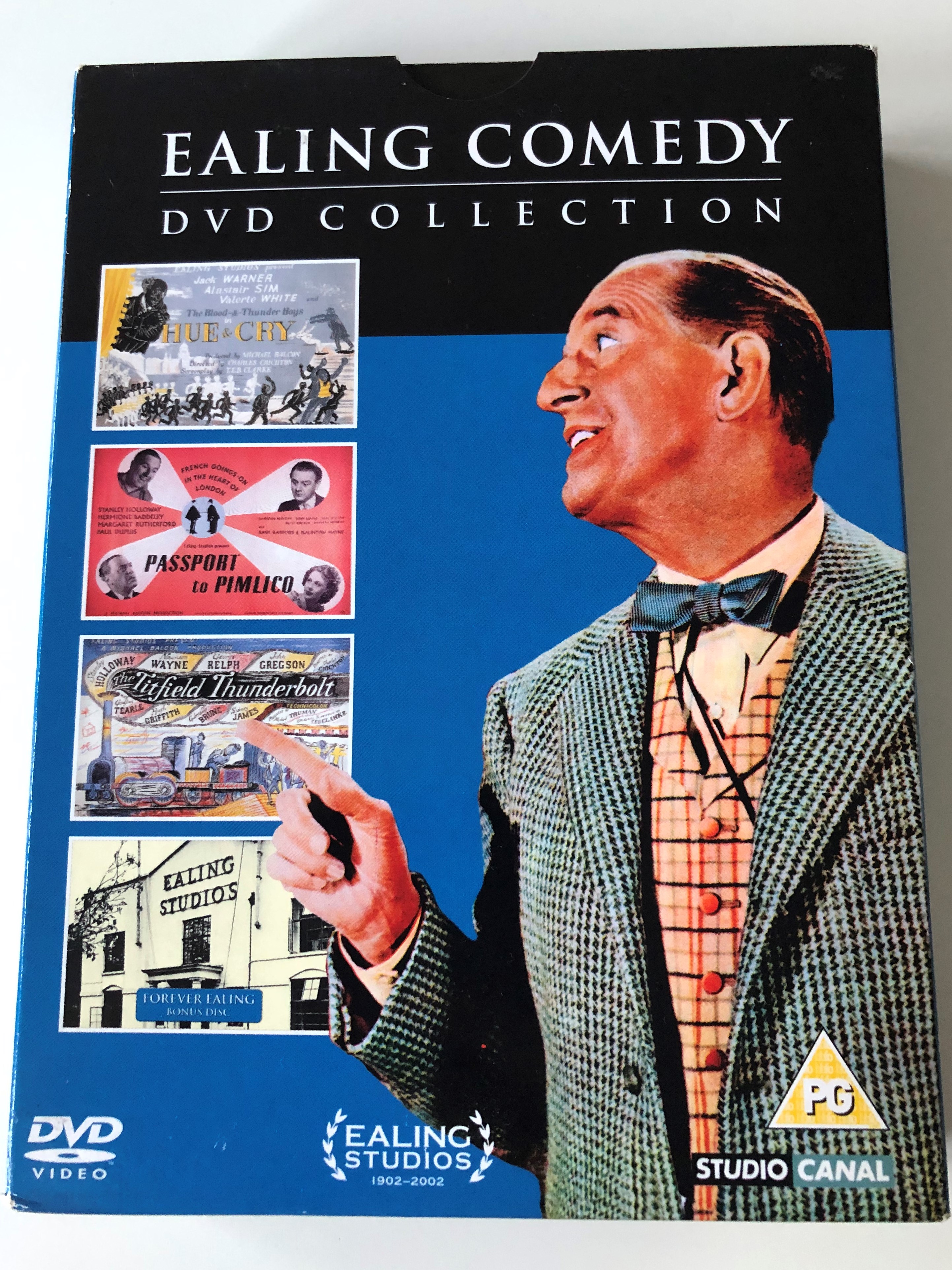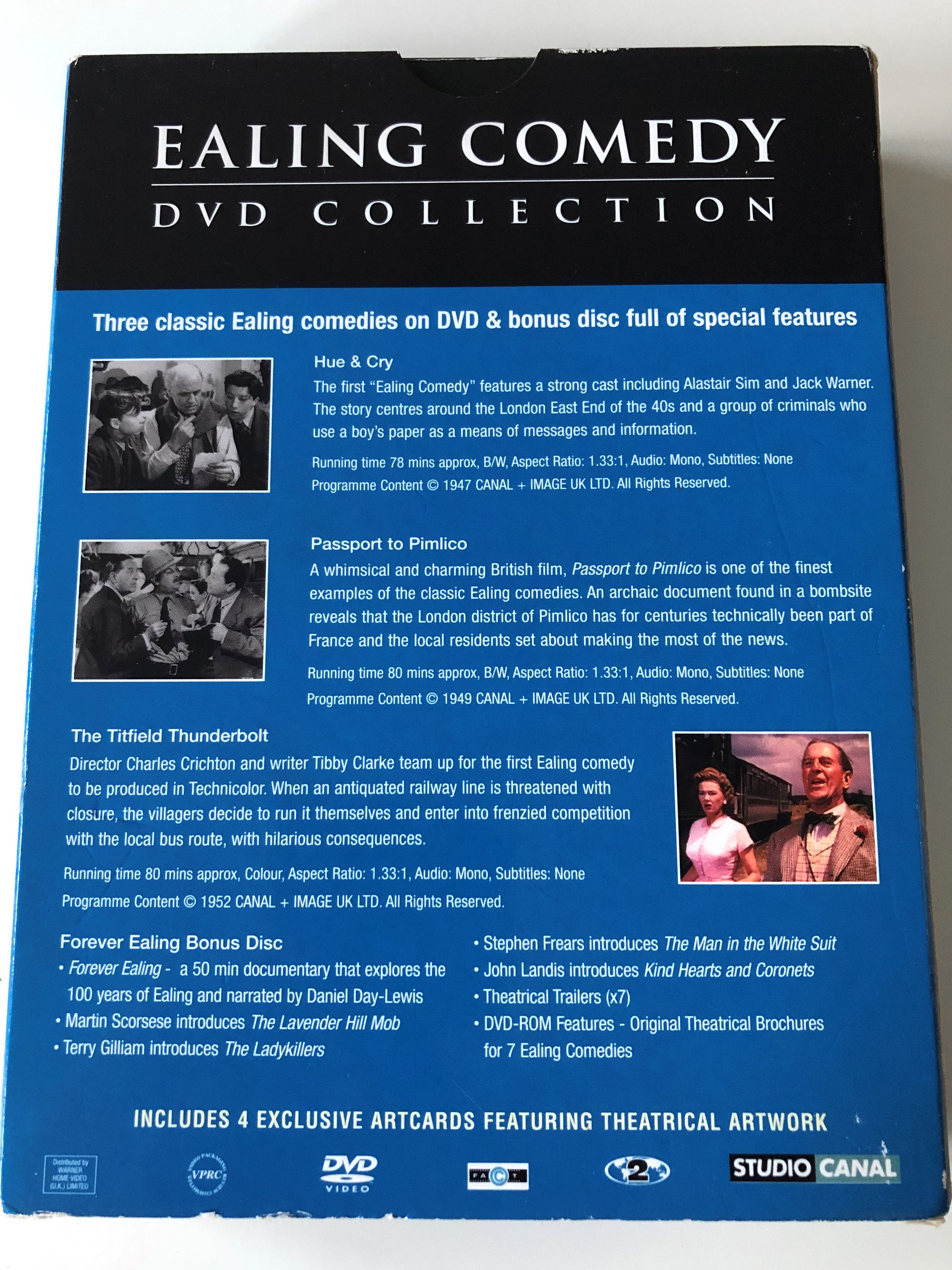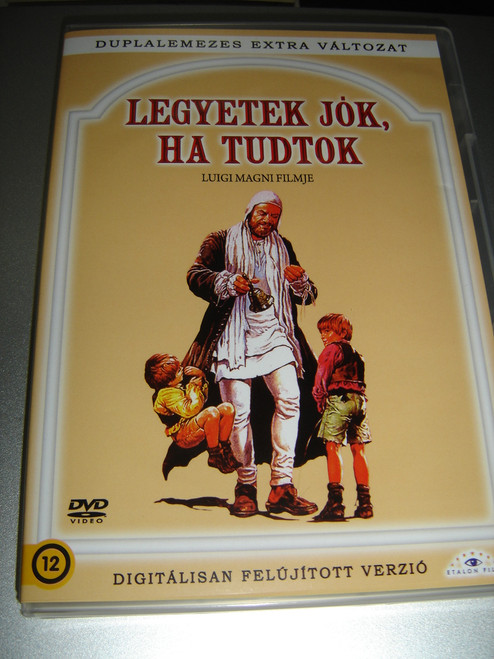Product Overview
Ealing comedy DVD Collection - Hue & Cry, Passport to Pimlico, The Titfield Thunderbolt, Forever Ealing Bonus Disc / 3 classic Ealing Comedies on dvd & Bonus / 4 discs /
UPC 7321900384865
REGION 2 PAL DVD
MADE IN THE UK
AUDIO: English mono
Total Runtime: 288 minutes (4 discs)
INCLUDES 4 EXCLUSIVE ARTCARDS FEATURING THEATRICAL ARTWORK
!!! Condition of this DVD set is USED VERY GOOD !!!
English Summary:
Hue and Cry is a 1947 British film directed by Charles Crichton and starring Alastair Sim, Harry Fowler and Joan Dowling.
It is generally considered to be the first of the Ealing comedies, although it is better characterised as a thriller for children. Shot almost entirely on location, it is now a notable historic document due to its vivid portrait of a London still showing the damage of the Second World War. London forms the backdrop of a crime-gangster plot which revolves around a working class children's street culture and children's secret clubs.
Following church choir practice in 1946 east London, Joe Kirby (Harry Fowler) reads aloud to his gang (The Blood and Thunder Boys) from the Trump boys' comic, but finds a page missing. He then buys a copy so he can follow the adventures of fictional detective Selwyn Pike. While reading one part of the latest story, Joe finds the comic adventure being repeated exactly in real life when he comes across two men carrying a crate (Joe thinks they contain corpses) into Mr Jago's fur shop. Even the truck number plate—GZ 4216—matches the comic.
Cast:
- Alastair Sim as Felix H. Wilkinson
- Harry Fowler as Joe Kirby
- Douglas Barr as Alec
- Joan Dowling as Clarry
- Jack Warner as Nightingale
- Valerie White as Rhona Davis
- Jack Lambert as Ford
- Ian Dawson as Norman
- Gerald Fox as Dicky
- David Simpson as Arthur
- Albert Hughes as Wally
- John Hudson as Stan
- David Knox as Dusty
- Jeffrey Sirett as Bill
- James Crabbe as Terry
- Stanley Escane as Roy
- Frederick Piper as Mr. Kirby
- Vida Hope as Mrs. Kirby
- Heather Delaine as Dorrie Kirby
- Joe E. Carr as Short, Nattily-dressed Thug
- Henry Purvis as Larry the Bull
- Paul Demel as Jago
- Alec Finter as Detective Sergeant Fothergill
- Arthur Denton as Vicar
- Robin Hughes as Selwyn Pike
- Howard Douglas as Watchman
- Bruce Belfrage as BBC announcer
- Grace Arnold as Dicky's Mother
Passport to Pimlico is a 1949 British comedy film made by Ealing Studios and starring Stanley Holloway, Margaret Rutherford and Hermione Baddeley. It was directed by Henry Cornelius and written by T. E. B. Clarke. The story concerns the unearthing of treasure and documents that lead to a small part of Pimlico to be declared a legal part of the House of Burgundy, and therefore exempt from the post-war rationing or other bureaucratic restrictions active in Britain at the time.
The film's opening credits end with the words "dedicated to the memory of", with an image of Second World War British food and clothing ration coupons.[2]
In post-Second World War London, an unexploded bomb detonates in Miramont Gardens, Pimlico. The explosion reveals a buried cellar containing artwork, coins, jewellery and an ancient manuscript. The document is authenticated by the historian Professor Hatton-Jones as a royal charter of Edward IV that ceded a house and its estates to Charles VII, the last Duke of Burgundy, when he sought refuge there after being presumed dead at the 1477 Battle of Nancy. As the charter had never been revoked, an area of Pimlico is declared to still be a legal part of Burgundy.
As the British government has no legal jurisdiction, it requires the local residents to form a representative committee according to the laws of the long-defunct dukedom before negotiating with them. Ancient Burgundian law requires that the Duke himself appoint a council. Sébastien de Charolais arrives and presents his claim to the title, which is verified by Professor Hatton-Jones. He forms the governing body which includes the local policeman, Spiller, and the manager of the bank branch, Mr. Wix; the neighbourhood shop keeper, Arthur Pemberton, is appointed as Burgundy's Prime Minister. The council begin discussions with the government, particularly about the Burgundian treasure.
Cast:
- Stanley Holloway as Arthur Pemberton
- Betty Warren as Connie Pemberton
- Barbara Murray as Shirley Pemberton
- Paul Dupuis as Sébastien de Charolais, Duke of Burgundy
- John Slater as Frank Huggins
- Jane Hylton as Molly Reed
- Raymond Huntley as Mr. Wix
- Philip Stainton as PC Spiller
- Roy Carr as Benny Spiller
- Sydney Tafler as Fred Cowan
- Nancy Gabrielle as Mrs. Cowan
- Malcolm Knight as Monty Cowan
- Hermione Baddeley as Edie Randall
- Roy Gladdish as Charlie Randall
- Frederick Piper as Jim Garland
- Charles Hawtrey as Bert Fitch
- Margaret Rutherford as Professor Hatton-Jones
- Naunton Wayne as Straker
- Basil Radford as Gregg
- Paul Demel as Central European
The Titfield Thunderbolt is a 1953 British comedy film directed by Charles Crichton and starring Stanley Holloway, Naunton Wayne, George Relph and John Gregson. The screenplay concerns a group of villagers trying to keep their branch line operating after British Railways decided to close it. The film was written by T. E. B. Clarke and was inspired by the restoration of the narrow gauge Talyllyn Railway in Wales, the world's first heritage railway run by volunteers. The name "Titfield" is an amalgamation of the villages of Limpsfield and Titsey in Surrey, near Clarke's home at Oxted.
The residents of the village of Titfield are shocked to learn that their railway branch line to the town of Mallingford is to be closed. Sam Weech, the local vicar and a railway enthusiast, and Gordon Chesterford, the village squire, decide to take over the line by setting up a company through a Light Railway Order. Upon securing financial backing from Walter Valentine, a wealthy man with a fondness for daily drinking, the men learn that the Ministry of Transport will give them a month's trial period, in which they must pass an inspection at the end of this period to make the Order permanent. While Weech is helped by Chesterford and retired track layer Dan Taylor in running the train, volunteers from the village help to operate the station.
Cast:
- Stanley Holloway as Walter Valentine
- George Relph as Vicar Sam Weech
- Naunton Wayne as George Blakeworth
- John Gregson as Squire Gordon Chesterford
- Godfrey Tearle as Ollie Matthews, the Bishop of Welchester
- Hugh Griffith as Dan Taylor
- Gabrielle Brune as Joan Hampton
- Sid James as Harry Hawkins
- Reginald Beckwith as Coggett
- Edie Martin as Emily
- Michael Trubshawe as Ruddock
- Jack MacGowran as Vernon Crump
- Ewan Roberts as Alec Pearce
- Herbert C. Walton as Seth
- John Rudling as Clegg
- Nancy O'Neil as Mrs Blakeworth
- Campbell Singer as Police Sergeant
- Frank Atkinson as Station Sergeant
- Wensley Pithey as Policeman































